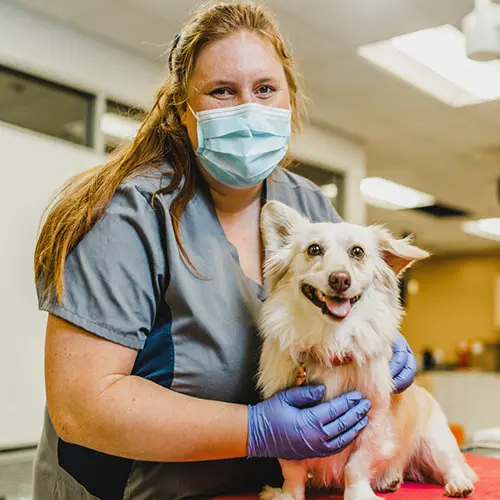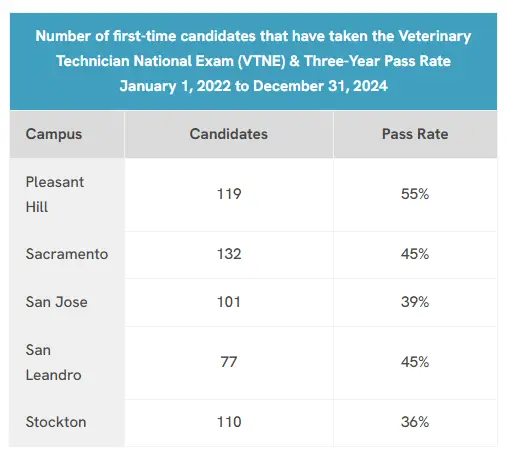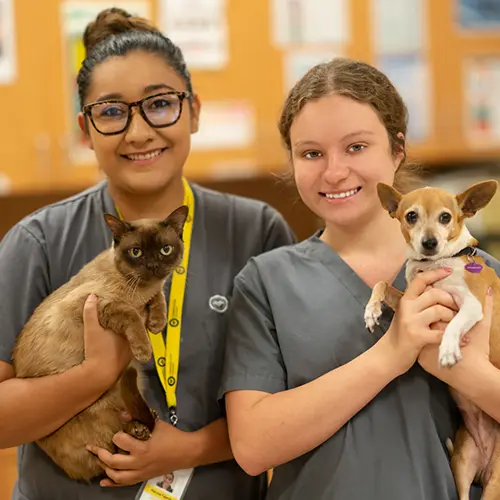Veterinary Technology

Request Information
All fields using an asterik (*) are required.
Request Information
*Required Field

Program Details
What Will I learn
Upon completion of the Veterinary Technology program, graduates will be able to:
- Outline the essential skills as defined by the AVMA required for the practice of veterinary technology in a wide range of practice settings.
- Understand procedures to engage in a safe work environment for clients, animals, and staff.
- Demonstrate ethical behavior consistent with state laws and regulations.
- Effectively communicate with the veterinary healthcare team and clients.
- Illustrate preparedness for taking the Veterinary Technology National Licensing Exam (VTNE).
Military Policy
Cost & Financial Aid
Your education is an investment in your future, and Carrington College is here to help. We offer a variety of financial aid options, including federal, state, and private programs, as well as student loans, grants, and scholarships are available for those who qualify. Each program has different requirements and application instructions. Our team is here to guide you through the options and application process.
Academic Cost
For complete details on current tuition costs, please refer to the Academic Catalog.
Location Availability
We’re proud to offer our accredited program in Veterinary Technology at multiple locations:
Accreditation & Approvals
Carrington College is accredited by the Accrediting Commission for Community and Junior Colleges, 428 J Street, Suite 400, Sacramento, CA 95814; 415 506 0234 an institutional accrediting body recognized by the Council for Higher Education Accreditation and the U.S. Department of Education. Additional information about accreditation, including the filing of complaints against member institutions, can be found at accjc.org.
For comprehensive information on Carrington College’s accreditation and approvals, visit carrington.edu/accreditation-and-approvals/.
The Veterinary Technology programs at the Pleasant Hill, Sacramento, San Jose, San Leandro and Stockton campuses are accredited by the American Veterinary Medical Association. 1931 North Meacham Road, Suite 100, Schaumburg, IL 60173-4360; 800 248 2862, www.avma.org/professionaldevelopment/education/accreditation/programs/pages/default.aspx.
Course Catalog
Program Specific Disclosures
MISSION
The mission of the Veterinary Technology program is to provide local and global veterinary communities with ethical graduates committed to lifelong learning and professional development. Graduates will have the entry-level skills and knowledge required for contemporary veterinary practice. The core program focus is companion animal practice, but all facets of veterinary medicine, including large animal medicine, biomedical research, and industry-related topics are emphasized.
Veterinary Technician National Exam (VTNE)

Continuing Education For Graduates
Student Outcomes
REAL WORLD SKILLS
START YOUR PATH
FLEXIBLE LEARNING OPTIONS
AFFORDABLE TUITION
Sarah K.
2021 Veterinary Technology Graduate

Career Opportunities
A veterinary technician works under the supervision of a licensed veterinarian. Veterinary technologists and technicians typically work in private clinics and animal hospitals. They also may work in laboratories, colleges and universities, and humane societies.2
Vet tech responsibilities may include performing tests, analyzing samples, and preparing vaccines in a lab environment to diagnose and treat diseases in animals. Other times they work in a private clinical practice where they take on some responsibility of talking to and educating pet owners. They may assist veterinarians with surgical procedures or projects like biomedical research. They are responsible for the humane treatment of animals in research-related jobs.1
What Will I Learn?
Surgical Assisting
Anesthesia for Veterinary Technicians
Basic Anatomy and Physiology
Large Animal Medicine
Check out our guide on becoming a Veterinary Technician.
If you love animals and want to work with them professionally, a career as a veterinary technician offers you the chance to help animals in both in-person and research settings. You also have the chance to work with pet owners and ease their fears or educate them about their pets.
Discover What It's Like in the Veterinary Technology Program at Carrington College
Veterinary Technology FAQ
-
To be a Veterinary Technician, some states may need an Associate’s Degree or Bachelor’s Degree. And although the rules can vary by location, most states require a credentialing exam–or Veterinary Technician National Examination (VTNE), offered by the American Association of Veterinary State Boards.3
Here are a few steps to consider:
- Step 1: Get a high school diploma or GED equivalent. Those interested in becoming a veterinary technician can prepare by taking biology and other science courses in high school. If these classes aren’t offered at your school, you can still volunteer at a local animal clinic or shelter.
- Step 2: Complete an accredited degree program. Please note, that the American Veterinary Medical Association (AVMA) accredits both bachelor’s and associate degree programs.
- Step 3: Pass the credentialing exam. Most states require technicians to pass the Veterinary Technician National Examination (VTNE) administered by the American Association of Veterinary State Boards.
-
Earning an Associate Degree from Carrington College can prepare you for several opportunities in an animal facility. A sample of reported job titles include4:
- Veterinary Technician
- Emergency Veterinary Technician
- Veterinary Laboratory Technician
- Internal Medicine Veterinary Technician
-
The cost of a Veterinary Technology program depends on the school, its location, plus any financial aid you may receive. For program pricing information, refer to the current Carrington College Catalog.
-
A Veterinary Technology program may take up to two years to complete, based on the certificate, diploma, or degree standards of your school. At Carrington College, you can earn an Associate Degree and prepare for the Veterinary Technician National Examination* in as few as 19 months.
-
Veterinary technologists and technicians typically work in private clinics and animal hospitals. They also may work in laboratories, colleges and universities, and humane societies.2
Sources:
*Carrington College prepares students to take appropriate certification and licensure exams related to their individual majors. The College does not guarantee students will successfully pass these exams or be certified or licensed as a result of completing the program.
- www.bls.gov/ooh/healthcare/veterinary-technologists-and-technicians.htm#tab-2
- www.bls.gov/ooh/healthcare/veterinary-technologists-and-technicians.htm#tab-3
- www.bls.gov/ooh/healthcare/veterinary-technologists-and-technicians.htm#tab-4
- veterinarybusinessadvisors.com/veterinary-nurse-versus-technician-the-pros-and-the-cons/